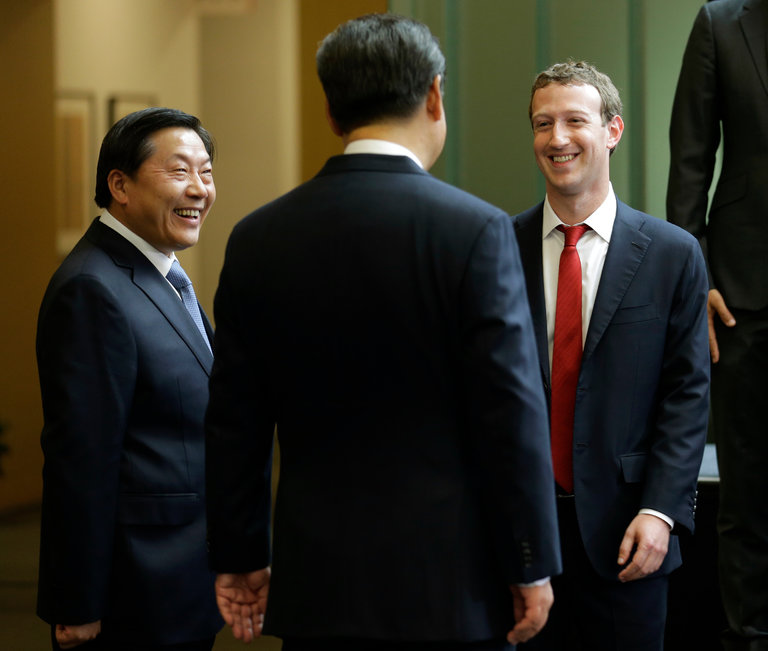New York Times: Facebook will create censorship tools to return to China

Mark Zuckerberg, the head of the social networking site Facebook, has long begun to build relationships with the Chinese leadership. In particular, he was able to talk with the head of the country Xi Jinping, telling about his interest in learning Chinese. These meetings, as far as can be judged, were held in a friendly atmosphere, but their goal was not to discuss the problems of linguistics and languages at all. In fact, Facebook plans to return to the Chinese market. But there is one difficulty on this road - to work in China, it is necessary to subject the content of the social network to censorship, as required by the authorities.
According to the journalists of the New York Times, now Facebook is just developing tools for censorship. We are talking about creating algorithms that hide posts of a certain subject in given regions. About this, according to journalists, told three employees of Facebook - as working in the company, and ex-employees.
It is worth noting that for Facebook, hiding content is not at all new. Social networks have to do so, for example, in Pakistan, Turkey or Russia. Unfortunately, there is no large amount of open censorship data, but it is known that from July to December 2015, the social network blocked about 50,000 information elements. Now the company is developing a very specific software platform in order to get approval from the Chinese authorities to resume work in the country. This platform will allow a third party to track popular posts and topics that social network users are interested in. Thanks to this platform, “observers” from China will have the opportunity to decide which posts may appear in user feeds and which ones may not.
')

Some employees of the social network reported that the development of software that provides third-party access to content is only a potential that is now being discussed by management. It is likely that this decision will not be approved, but the fact that it is being actively discussed causes some concern.
Facebook can be understood - hundreds of millions of Internet users from China are at stake. These are potential users of the social network and buyers of goods and services offered by Facebook partners. In China, the American social network has been banned since 2009. The government then issued a clear decree on what content could not come into the country with instructions on how to solve the problem. Initially, this instruction by Zuckerberg did not satisfy, but times change.
Now Facebook is widely using software to block some materials that are on the list of the most discussed.
A Facebook spokesman said the following: “We have long been saying that we are interested in China. We are trying to understand and explore the country. ”
It is worth noting that in China, there are often problems with online services. Not only Facebook, but other American companies, including Google, cannot enter the Chinese market. In 2010, Google redirected users from China to servers that were hosted (and hosted) in Hong Kong. As for other companies, for example, LinkedIn, they work without any problems in China after agreeing to censor certain types of content.

It is quite possible that Facebook’s attempts to come to China will not bring anything, since the Chinese are now concerned not only with censorship, but also with the development of their own segment of the Internet business. The Chinese government often goes to meet its citizens and companies competing with similar products. This is, for example, the sale of Uber's business in China after the appearance of a direct competitor to a taxi company in this country.
A number of analysts believe that the best strategy for Facebook is to use the business model that a social network uses when working with Internet companies or investors.
Zukurberg has been trying to negotiate with the Chinese authorities for a long time. So the current meetings with the leadership of the country, perhaps - the final stage of the process of communication, with the conclusion of a contract. Earlier this year, many programmers were removed from their jobs to work "elsewhere."
In China, Facebook is still working through servers physically located in Hong Kong. In order for a Chinese citizen to get his Facebook batch, he must connect via VPN. Only in this case it is possible to bypass various systems of blocking and filtering content.
The problem here is not only with China. The fact is that if other countries see that the social network is gradually introducing censorship, then any state can demand to remove content of a certain type. By the way, in July of this year, Mark Zuckerberg was asked questions about the possibility of introducing censorship on Facebook. Then he answered the following: “For Facebook, it’s better to participate in a conversation than not to participate.” This probably means that the company will still continue to contact the Chinese government in the hope of obtaining a work permit in the Middle Kingdom.
Source: https://habr.com/ru/post/399381/
All Articles